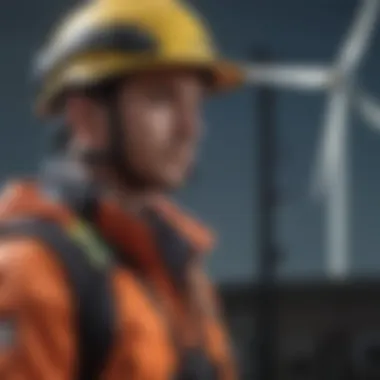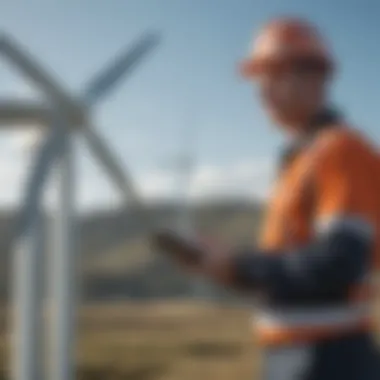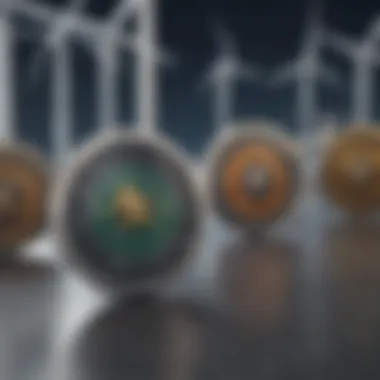Essential Qualifications for Becoming a Wind Turbine Technician


Market Analysis
In delving into the qualifications required for becoming a wind turbine technician, it is crucial to assess the current market trends in the renewable energy sector. The growing global focus on sustainability and clean energy sources has significantly increased the demand for skilled professionals in this field. With governments and corporations alike committing to reducing carbon emissions, the wind energy industry is poised for substantial growth. Industry-specific analysis reveals that advancements in wind turbine technology continue to drive the market forward, creating opportunities for individuals with the right qualifications to excel. However, it is important to note the market volatility and risk factors inherent in the sector, including fluctuations in government policies and economic conditions that could impact job stability.
Economic Insights
An overview of economic indicators showcases the role of wind energy in the broader economic landscape. The shift towards renewable sources of energy is not only driven by environmental concerns but also by economic considerations. Global economic trends highlight the increasing investments in wind power projects worldwide, underpinned by the push for sustainable development. Economic events such as policy changes and energy market shifts can have a direct impact on job prospects and industry growth. Understanding these economic dynamics is key for prospective wind turbine technicians.
Investment Strategies
Personal Finance Management
Beyond qualifications, individuals entering the wind turbine technician field should pay attention to personal finance management. Budgeting tips can assist in managing income and expenses effectively, especially important for those pursuing certification or further education. Savings and retirement planning are crucial for long-term financial stability, with opportunities for wind technicians to secure their futures through smart investment choices. Debt management advice is also relevant, considering the potential costs associated with acquiring the necessary qualifications for this career path.
Expert Financial Advice
For aspiring wind turbine technicians seeking to navigate the financial aspects of their careers, expert financial advice can be invaluable. Beginners in the industry may benefit from insights on how to start investing wisely, using their income to generate long-term returns. Advanced trading techniques could offer seasoned professionals strategic approaches to maximizing their wealth within the renewable energy sector. Wealth preservation strategies provide a roadmap for sustaining financial well-being throughout a wind turbine technician's career, ensuring stability and growth in the face of changing market conditions.
Introduction
In the realm of renewable energy, the role of a wind turbine technician stands as a crucial linchpin. This introductory section aims to illuminate the key qualifications essential for individuals aspiring to venture into the realm of wind turbine technology. By delving into the educational prerequisites, technical proficiencies, and certification requirements, this article serves as a foundational guide for those looking to traverse a promising and dynamic career path in the field of wind energy.
Overview of Wind Turbine Technician Role


Embarking on a career as a wind turbine technician entails a multifaceted role that blends technical expertise with a deep-rooted commitment to sustainable energy practices. Individuals in this role are tasked with not only operating and maintaining wind turbines but also troubleshooting technical issues and ensuring optimal functionality of these renewable energy structures. A thorough understanding of wind turbine mechanics, data analysis, and safety protocols is paramount for success in this profession.
Significance of Proper Qualifications
The significance of possessing the right qualifications in the realm of wind turbine technology cannot be overstated. Proper qualifications not only serve as a testament to an individual's competence and expertise but also ensure the seamless operation and longevity of wind energy systems. By honing specialized skills, obtaining relevant certifications, and meeting industry standards, aspiring wind turbine technicians equip themselves with the tools necessary to thrive in a fast-evolving and impactful sector of the energy industry.
Educational Requirements
In the realm of becoming a proficient wind turbine technician, a robust educational foundation serves as the cornerstone of success. The significance of educational requirements cannot be overstated, as they lay the groundwork for acquiring the skills and knowledge essential for excelling in this demanding field. By focusing on specific educational elements such as high school diploma or its equivalent, post-secondary education in renewable energy, and specialized training programs, aspiring individuals can meticulously hone the expertise necessary to thrive in the wind energy sector. These educational prerequisites not only provide theoretical insights but also offer practical training, ensuring a well-rounded preparation for the complex challenges that wind turbine technicians face on a daily basis.
High School Diploma or Equivalent
Securing a high school diploma or its equivalent is the initial stepping stone towards entering the domain of wind turbine technology. This foundational educational requirement instills fundamental skills in mathematics, physics, and technical drawing that form the basis of understanding the mechanics behind wind turbines. Additionally, a high school education cultivates critical thinking and problem-solving abilities, which are indispensable for diagnosing and resolving intricate issues encountered when operating and maintaining wind turbines. While a high school diploma serves as a minimum qualification, individuals with additional certifications or coursework in related fields can enhance their candidacy and stand out in this competitive industry.
Post-Secondary Education in Renewable Energy
Furthering one's education with specialized coursework in renewable energy can significantly augment the skill set needed to excel as a wind turbine technician. Post-secondary programs focus on the intricacies of renewable energy systems, sustainability practices, and advanced concepts in wind turbine technology. Through in-depth theoretical studies and practical hands-on training, individuals can gain a deep understanding of the environmental impacts of wind energy and develop innovative solutions for optimizing turbine performance. A post-secondary education also facilitates networking opportunities and internships, fostering valuable connections within the renewable energy sector.
Specialized Training Programs
Complementing formal education, specialized training programs offer a targeted approach to acquiring industry-specific skills required for wind turbine maintenance and repair. These programs delve into topics such as turbine components, safety protocols, electrical systems, and troubleshooting techniques, providing hands-on experience in realistic settings. By enrolling in specialized training courses, aspiring wind turbine technicians can accelerate their learning curve and gain practical insights that are directly applicable to real-world scenarios. Moreover, obtaining certifications from reputable training programs enhances credibility and showcases a commitment to professional development, increasing employability and advancement opportunities in the field.
Technical Skills
Understanding, cultivating, and honing technical skills is imperative for individuals aiming to excel as wind turbine technicians. In this article, the focus narrows down on the quintessential technical competencies required for success in this field. Technical skills encompass a spectrum of abilities that ensure seamless operation and maintenance of wind turbines, emphasizing efficiency and safety throughout. Without a doubt, a profound grasp of technical skills is the cornerstone of a successful career as a wind turbine technician.


Mechanical Aptitude
Mechanical aptitude stands out as a critical component of a wind turbine technician's skill set. Having a solid mechanical aptitude entails a knack for understanding machinery, gears, and mechanical systems. Wind turbine technicians must possess a deep comprehension of how turbines function, coupled with the ability to troubleshoot mechanical issues efficiently. Through this lens, mechanical aptitude proves indispensable when it comes to diagnosing and rectifying mechanical malfunctions swiftly, thus ensuring uninterrupted energy production. Therefore, aspiring wind turbine technicians should prioritize honing their mechanical aptitude to thrive in this dynamic industry.
Electrical Knowledge
Equally vital is a comprehensive understanding of electrical systems, for which wind turbine technicians must exhibit proficiency. Electrical knowledge plays a pivotal role in the installation, maintenance, and repair of wind turbines, necessitating a meticulous approach to handling electrical components. From wiring configurations to electrical safety protocols, technicians with a sound grasp of electrical systems are well-equipped to execute tasks with precision. In essence, electrical knowledge empowers technicians to navigate the intricate electrical framework of wind turbines adeptly, fostering optimal performance and reliability. Thus, emphasizing the acquisition and refinement of electrical knowledge is instrumental for individuals aspiring to thrive as wind turbine technicians.
Problem-Solving Abilities
Problem-solving abilities serve as a linchpin in the skill set of a successful wind turbine technician. The nature of the job often calls for quick thinking, analytical acumen, and adeptness at troubleshooting unforeseen issues. Wind turbine technicians must exemplify resilience in the face of challenges, employing strategic problem-solving tactics to mitigate downtime and uphold operational efficiency. By honing their problem-solving skills, technicians can navigate complex scenarios with agility and precision, ensuring the seamless operation of wind turbines. Consequently, developing robust problem-solving abilities is a non-negotiable aspect for individuals keen on excelling in the realm of wind energy technology.
Certifications and Licenses
Certifications and licenses play a pivotal role in the realm of wind turbine technician qualifications. In this competitive field, having the proper certifications and licenses can significantly enhance one's employability and credibility. Employers seek candidates who possess the relevant credentials to ensure a high level of competence and adherence to industry standards. Obtaining certifications and licenses demonstrates a commitment to professionalism and ongoing skill development, which are essential traits in the wind energy sector. Moreover, certifications and licenses act as formal validations of an individual's capabilities, instilling trust in clients and employers regarding the technician's expertise and proficiency.
Wind Turbine Technician Certification
Wind turbine technician certification is a fundamental requirement for individuals aspiring to excel in this field. This certification typically covers a wide range of topics, including technical knowledge, safety protocols, and industry best practices. It equips technicians with the necessary skills to operate, maintain, and repair wind turbines efficiently and safely. By acquiring this certification, technicians demonstrate their competence and dedication to upholding the highest quality standards in wind energy operations. Employers prioritize candidates with this certification due to the assurance it provides regarding the technician's abilities and professionalism.
Electrical License
Securing an electrical license is paramount for wind turbine technicians involved in electrical maintenance and repairs. This license signifies that the technician has met the required standards and qualifications to work on electrical systems safely and effectively. In the wind energy sector, where electrical components are integral to turbine functionality, holding an electrical license is non-negotiable. It ensures that technicians have the expertise to handle complex electrical tasks, troubleshoot issues, and ensure the smooth operation of turbines. Employers place great emphasis on this license as it underlines the technician's capability to handle electrical aspects with precision and adherence to electrical regulations and safety guidelines.
Physical Requirements


Physical requirements play a crucial role in the field of wind turbine technology. As wind turbine technicians work in physically demanding environments, ensuring that individuals meet specific standards is essential for job performance and safety. Understanding the importance of physical requirements within the realm of wind turbine technology is vital for anyone considering a career in this field.
Physical Fitness and Endurance
Physical fitness and endurance are paramount for wind turbine technicians. The nature of the job involves climbing tall structures and working in challenging conditions that demand strength and stamina. Technicians must possess adequate physical fitness to handle the rigors of the job effectively. Regular exercise and a focus on building endurance can help individuals meet the physical demands of the role, ensuring they can perform their duties safely and efficiently.
Comfort Working at Heights
Comfort working at heights is a non-negotiable aspect of being a wind turbine technician. This role often involves ascending to great heights to inspect, repair, and maintain wind turbines. Technicians must have a high level of comfort with heights to carry out their tasks without fear or hesitation. Overcoming any fear of heights through exposure and training is crucial for technicians to work effectively at elevated levels. Ensuring comfort working at heights is not only essential for job performance but also for ensuring the safety of oneself and others on the job site.
On-The-Job Training
On-The Job Training plays a pivotal role in preparing individuals for the practical aspects of becoming a proficient wind turbine technician. It bridges the gap between theoretical knowledge and real-world application, equipping trainees with the necessary skills and hands-on experience essential for success in this field. Through this immersive learning process, aspiring technicians gain valuable insights into the intricacies of wind turbine maintenance and operations, laying a solid foundation for their future endeavors. Moreover, On-The-Job Training provides a unique opportunity for individuals to familiarize themselves with the equipment, tools, and safety protocols specific to the wind energy industry.
Hands-On Experience
Hands-On Experience is a critical component of On-The-Job Training for wind turbine technicians. It enables trainees to actively engage in tasks such as troubleshooting, repair, and maintenance of wind turbines under the supervision of experienced professionals. This hands-on approach allows individuals to apply their theoretical knowledge in real-time scenarios, enhancing their understanding of the technical aspects involved. By actively participating in various on-site activities, trainees develop essential skills, including dexterity in handling tools, attention to detail, and teamwork, which are paramount for ensuring the smooth operation of wind turbines.
Safety Protocols and Procedures
Safety Protocols and Procedures hold utmost significance in the realm of wind turbine maintenance. In this high-risk environment, adherence to stringent safety measures is non-negotiable to prevent accidents and ensure the well-being of personnel. Trainees undergoing On-The-Job Training learn comprehensive safety protocols, including proper equipment handling, emergency procedures, and hazard awareness. By familiarizing themselves with these protocols, aspiring technicians cultivate a safety-first mindset that is essential for working efficiently and minimizing risks in the challenging conditions faced during wind turbine operations. Commitment to strict safety guidelines is foundational for a successful and sustainable career as a wind turbine technician.
Conclusion
In this article about the qualifications required to become a wind turbine technician, the Conclusion serves as a vital section summarizing the key points discussed throughout. Understanding the significance of having the right qualifications in this field is paramount for individuals aiming to excel in their careers. Whether considering the educational prerequisites, technical skills, or certifications necessary, this Conclusion brings together all aspects to emphasize the importance of a well-rounded skill set. By highlighting the core qualifications essential for success in this industry, individuals can better prepare themselves to meet the demands of the job and thrive in the role of a wind turbine technician.
Summary of Key Qualifications
Aspiring wind turbine technicians must possess a blend of educational backgrounds, technical competencies, and certifications to thrive in this field. Starting with a foundational requirement of a high school diploma or equivalent education, individuals are then encouraged to pursue post-secondary education in renewable energy to deepen their understanding of the sector. Moreover, specialized training programs offer hands-on experience and knowledge enhancement that is crucial for aspiring technicians. Technical skills such as mechanical aptitude, electrical knowledge, and problem-solving abilities are indispensable qualities for success in this role.
Certifications like the Wind Turbine Technician Certification and an Electrical License further validate the expertise and competency of individuals in this field. Physical fitness and comfort working at heights are also essential requirements due to the nature of the job. Through on-the-job training that emphasizes hands-on experience and safety protocols, aspiring wind turbine technicians can hone their skills and prepare for real-world challenges. By synthesizing these qualifications, individuals can embark on a rewarding career path as wind turbine technicians, contributing meaningfully to the renewable energy sector.















